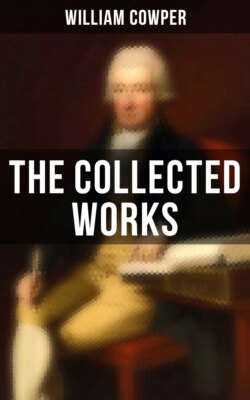Читать книгу The Collected Works - William Cowper - Страница 29
На сайте Литреса книга снята с продажи.
TO MRS. COWPER.
ОглавлениеTable of Contents
Huntingdon, April 17, 1766.
My dear Cousin—As in matters unattainable by reason and unrevealed in the Scripture, it is impossible to argue at all; so, in matters concerning which reason can only give a probable guess, and the Scripture has made no explicit discovery, it is, though not impossible to argue at all, yet impossible to argue to any certain conclusion. This seems to me to be the very case with the point in question——reason is able to form many plausible conjectures concerning the possibility of our knowing each other in a future state, and the Scripture has, here and there, favoured us with an expression that looks at least like a slight intimation of it; but because a conjecture can never amount to a proof, and a slight intimation cannot be construed into a positive assertion, therefore, I think, we can never come to any absolute conclusion upon the subject. We may, indeed, reason about the plausibility of our conjectures, and we may discuss, with great industry and shrewdness of argument, those passages in the Scripture which seem to favour the opinion; but still, no certain means having been afforded us, no certain end can be attained; and, after all that can be said, it will still be doubtful whether we shall know each other or not.
As to arguments founded upon human reason only, it would be easy to muster up a much greater number on the affirmative side of the question than it would be worth my while to write or yours to read. Let us see, therefore, what the Scripture says, or seems to say, towards the proof of it; and of this kind of argument also I shall insert but a few of those, which seem to me to be the fairest and clearest for the purpose. For, after all, a disputant on either side of this question is in danger of that censure of our blessed Lord's, "Ye do err, not knowing the Scripture, nor the power of God."
As to parables, I know it has been said in the dispute concerning the intermediate state that they are not argumentative; but, this having been controverted by very wise and good men, and the parable of Dives and Lazarus having been used by such to prove an intermediate state, I see not why it may not be as fairly used for the proof of any other matter which it seems fairly to imply. In this parable we see that Dives is represented as knowing Lazarus, and Abraham as knowing them both, and the discourse between them is entirely concerning their respective characters and circumstances upon earth. Here, therefore, our Saviour seems to countenance the notion of a mutual knowledge and recollection; and, if a soul that has perished shall know the soul that is saved, surely the heirs of salvation shall know and recollect each other.
In the first epistle to the Thessalonians, the second chapter, and nineteenth verse, Saint Paul says, "What is our hope, or joy, or crown of rejoicing? Are not even ye in the presence of our Lord Jesus Christ at his coming? For ye are our glory and our joy."
As to the hope which the apostle had formed concerning them, he himself refers the accomplishment of it to the coming of Christ, meaning that then he should receive the recompence of his labours in their behalf; his joy and glory he refers likewise to the same period, both which would result from the sight of such numbers redeemed by the blessing of God upon his ministration, when he should present them before the great Judge, and say, in the words of a greater than himself, "Lo! I and the children whom thou hast given me." This seems to imply that the apostle should know the converts and the converts the apostle at least at the day of judgment, and, if then, why not afterwards?
See also the fourth chapter of that epistle, verses 13, 14, 16, which I have not room to transcribe. Here the apostle comforts them under their affliction for their deceased brethren, exhorting them "not to sorrow as without hope;" and what is the hope, by which he teaches them to support their spirits? Even this, "That them which sleep in Jesus shall God bring with him." In other words, and by a fair paraphrase surely, telling them they are only taken from them for a season, and that they should receive them at their resurrection.
If you can take off the force of these texts, my dear cousin, you will go a great way towards shaking my opinion: if not, I think they must go a great way towards shaking yours.
The reason why I did not send you my opinion of Pearsall was, because I had not then read him; I have read him since, and like him much, especially the latter part of him; but you have whetted my curiosity to see the last letter by tearing it out; unless you can give me a good reason why I should not see it, I shall inquire for the book the first time I go to Cambridge. Perhaps I may be partial to Hervey for the sake of his other writings, but I cannot give Pearsall the preference to him, for I think him one of the most scriptural writers in the world.
Yours,
W. C.
